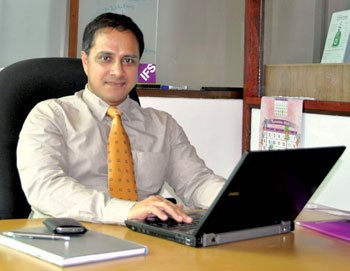ERP still a niche market
Charumini DE SILVA
 Business application solutions or commonly referred as Enterprise Business application solutions or commonly referred as Enterprise
Resource Planning (ERP) is still a niche market in Sri Lanka.
Marketing in this space should be much focused and it should be response
related. The product we are talking about is also a service. It is a
combination of both; it is intangible and expensive. And it can bring in
greater value for the organization and would make life easy for the
user. Organizations need ERP for complex decision making. However, the
numbers of ERP running organizations in Sri Lanka are few compared to
other regional countries. Organizations in Sri Lanka should be aware and
need much more maturity for this industry. For this to happen IT as a
whole should be embraced more by society and organizations.
With the Government drive to make Sri Lanka as a IT hub and having
more emphasis into IT spending and IT literacy even in schools, IT
knowledge will increase. And when the exponential growth takes place,
more and more companies will look at ERP solutions, and that is the
growth potential we are looking for and are working towards creating,
IFS South Asia Sales and Marketing Manager South Asia, Shiraz Lye told
Daily News Business.
Excerpts of the interview with him
|

IFS South Asia Sales and Marketing Shiraz Lye |
Q: As a marketeer what's your perception about using Corporate
Social Responsibility (CSR) as a marketing tool?
A: My view is that organizations survive because of society.
It is society that pays the salary of the employee and it is the society
that gives the profits to the shareholder. The organization will grow
only if there is a growing society. I believe without society there
would not be any market for any organizations. The corporates should not
use CSR targeting publicity. They should share their wealth with society
without expecting in return. The expectation should be to build a better
and profitable societies and then the return would come inevitably.
Q: How do you align 4P's (Price, Place, People and Promotion)
to suit global changes?
A: When you talk about Price, IFS was one responsible factor
to bring down prices of ERP globally. It was our technology that
introduced component based architecture and with it the concept of buy
what you need when you need and grow with it.
This approach makes organizations to invest low initially and then to
grow.
During the recession we had the advantage as more organizations
looked at first focusing on their burning points such as supply chain,
production, planning and later streaming down to other functionalities
such as HR, Sales and Marketing, Service and many others.
IFS gives the comfort of being right next you. The company has
offices in more than 50 countries and all around it has bought in the
comfort and assurance to the customers of the much needed support.
In Sri Lanka IFS have two offices (Colombo and Kandy). We reach
customers through our own offices and has a direct link for fast and
sure response.
The corporate office in Sweden analyses through its regional offices
of global changes in markets and builds strategies around it and put
resources in terms of partnerships, in terms of R & D work for new
products, or product enhancements. This has resulted in IFS having end
to end solutions with four core processes of any organizations covered
and in 22 languages in the system.
We even did run few reports in Sinhala. Being at the right place at
the right time is another success factor for IFS' growth. IFS has a
unique selling proposition which is in Sri Lanka, which is people or its
consultants and engineers.
They are the life blood of the IFS implementation. ERP is a product
as well as a service. The services are done by the people. The advantage
we have is that unlike other vendors, IFS implementation is been done by
its own consultants. The promotions and communications are based on
focus and are response related. Changes in market dynamics locally and
globally has very little effect in the type of communications we do in
this industry. But the campaigns and messages may change from time to
time.
Q: What are the mechanisms used to identify new trends and
challenges in the markets both locally and internationally?
A: IFS is a global company where each office has a team of
marketeers and a team of front line sales. Through this channel market
information, trends, and intelligence is gathered and put together as
digestible information.
Q: What is the importance of innovation, invention and
re-design in marketing?
A: All these three elements are equally important to a growth
of a company. An organization would be sluggish and at a standstill if
they do not have a culture of innovating, inventing and re-designing.
This is much more amplified in the IT industry. What is successful and
right today may not be the case tomorrow. Strategies and processes bring
in advantage and revenue today would not be the same tomorrow. This is a
simple fact to understand in a market which is running at a pace no one
deemed possible ten to fifteen years ago. The speed of technology
development and the speed it reached the mass is remarkable, as it took
more than 100 years for the classical telephone to reach one million
households from the day it was introduced. That is the speed of world is
moving today and to keep up to it; one needs innovative thinking,
inventions and re-designing in culture.
Q: Do you think customer orientation is most important in Sri
Lanka?
A: Customer orientation is another factor most organizations
forget when they grow out of proportion. The front line staff takes up
the attitude of that they are there to help the consumer. I believe that
the consumer helps the organization. Thus the customer should be placed
at their top of the priority list. In Sri Lanka, there is lot to improve
when it comes to customer orientation. Currently what I see is that the
concept is limited only to training programs and advertisements.
However, I have seen a few out of the world customer orientated
individuals and they single handedly through their actions and attitudes
manage to keep the concept of customer orientation alive.
Q: How far can you be satisfied with the customer
accessibility of the product or services?
A: We need lots of improvement in customer accessibility. Sri
Lanka is still not at a leading phase when it comes to the IT industry.
Although people have access, majority of the population are not aware of
the ERP product. This is the area that Sri Lanka should now focus in
educating the people. Improving the knowledge and educating the public
is vital to develop the IT industry of our country. The Government has
recognized the significance of this segment and is taking a good effort
in uplifting the industry.
Q: What is your view about global branding?
A: There is only one market. We cannot segregate global and
local any more. With the growth of ICT any new product that is
introduced could reach the farthest location in the world. Multinational
and Transnational organizations are dominating communications and the
airwaves and one who would not think of global branding will not have
space. Global branding brings in one culture for the brand. By global
branding, other than regional or country cultures, a new culture is
created unique to that brand.
Q: Where do local marketeers stand in the international arena?
A: Sri Lankan marketeers are equal in creativity and
adaptability. But they need improvements on responsible marketing or
Return on Investment (ROI) based marketing. Improvement in visionary and
proactive based marketing is vital. I believe this would come soon as
organizations now pay great emphasis for marketing. Majority of the
marketeers are now in most of the boards and in senior level management.
This trend would certainly help marketeers to go into the next levels
and be on par or even above the peers in international arena.
Q: If you did not select marketing as your career, where would
you stand today?
A: I might have ended up as a pilot in the Sri Lanka Air
Force.
|



